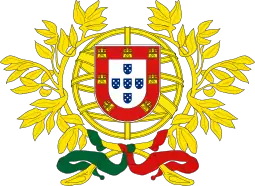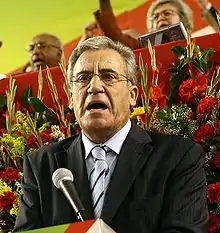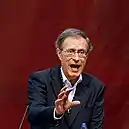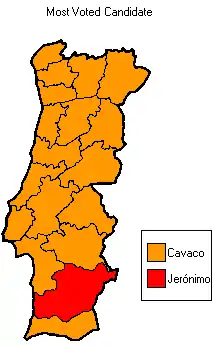2006 Portuguese presidential election
A Portuguese presidential election was held on 22 January 2006 to elect a successor to the incumbent President Jorge Sampaio, who was term-limited from running for a third consecutive term by the Constitution of Portugal. The result was a victory in the first round for Aníbal Cavaco Silva of the Social Democratic Party candidate, the former Prime Minister, won 50.54 percent of the vote in the first round, just over the majority required to avoid a runoff election. It was the first time in which a right-wing candidate was elected President of the Republic since the 1974 Carnation Revolution.
| ||||||||||||||||||||||||||||||||||||||||
| Turnout | 61.5% | |||||||||||||||||||||||||||||||||||||||
|---|---|---|---|---|---|---|---|---|---|---|---|---|---|---|---|---|---|---|---|---|---|---|---|---|---|---|---|---|---|---|---|---|---|---|---|---|---|---|---|---|
| ||||||||||||||||||||||||||||||||||||||||
| ||||||||||||||||||||||||||||||||||||||||
 |
|---|
| This article is part of a series on the politics and government of Portugal |
| Constitution |
Voter turnout was 61.53 percent for eligible voters.
Procedure
Any Portuguese citizen over 35 years old has the opportunity to run for president. In order to do so it is necessary to gather between 7500 and 15000 signatures and submit them to the Portuguese Constitutional Court.
According to the Portuguese Constitution, to be elected, a candidate needs a majority of votes. If no candidate gets this majority there will take place a second round between the two most voted candidates.
Political context
In the presidential election of 14 January 2001, the outgoing Socialist Jorge Sampaio was re-elected in the first round with 55% of votes. Because he was term-limited, he was forbidden, by the Constitution, to run for a third consecutive term.
In the parliamentary elections of 20 February 2005, the Socialist Party, led by José Sócrates, won for the first time in its history an absolute majority of seats, while the Social Democratic Party led by Prime Minister Pedro Santana Lopes fell below 30%, their worst result since 1983.
To cope with the bad fiscal situation, the government introduced a policy of fiscal restraint, combining higher taxes, lower public treatments and privatization. This policies were not popular and as a result, the Socialists were defeated in the local elections on 9 October 2005. In the follow up for the presidential elections, the Socialists decided to nominate their former secretary-general, Mário Soares, President of the Republic between 1986 and 1996. This decision divided the party, which led Manuel Alegre, a member of the party parliamentary group, to announce his candidature as an independent. The Social Democratic Party opted to support their former leader Aníbal Cavaco Silva, Prime Minister from 1985 to 1995, and presidential candidate defeated in 1996.
Candidates
Thirteen citizens sought election officially, but only six gathered the 7,500 signatures required under the constitution to be a candidate in the poll:
Official candidates
- Manuel Alegre, a Socialist Party politician who ran without the official backing of his party;
- Aníbal Cavaco Silva, Prime Minister from 1985 to 1995, supported by the Social Democratic Party and by the People's Party;
- Francisco Louçã, coordinator of the political commission of the Left Bloc;
- Garcia Pereira, Secretary-General of the PCTP/MRPP;
- Mário Soares, President from 1986 to 1996, the official candidate of the Socialist Party; and
- Jerónimo de Sousa, Secretary-General of the Portuguese Communist Party, also supported by the Ecologist Party "The Greens".
All the candidates except for Cavaco Silva are considered to be from the Portuguese political left.
Unsuccessful candidacies
The other potential candidates who, according to the Constitutional Court, did not gather enough signatures, were:
- Josué Rodrigues Gonçalo Pedro;
- Luís Filipe Guerra, leader of the Humanist Party;
- Teresa Lameiro;
- Manuela Magno, nuclear physicist;
- Carmelinda Pereira, leader of the Workers Party of Socialist Unity (POUS);
- Luís Botelho Ribeiro; and
- Diamantino da Silva;
Campaign period
Party slogans
| Candidate | Original slogan | English translation | Refs | |
|---|---|---|---|---|
| Aníbal Cavaco Silva | « Portugal Maior » | "Greater Portugal" | [1] | |
| Mário Soares | « Sempre presente nos momentos difíceis » | "Always present in difficult times" | [2] | |
| Manuel Alegre | « O poder dos cidadãos » | "The power of citizens" | [3] | |
| Jerónimo de Sousa | « Com toda a confiança » | "With all confidence" | [4] | |
| Francisco Louçã | « Rigor, Solidariedade » | "Rigor, Solidarity" | [5] | |
| António Garcia Pereira | « A coragem de mudar de rumo » | "The courage to change course" | [6] | |
Candidates' debates
| 2006 Portuguese presidential election debates | ||||||||||||||||||||
|---|---|---|---|---|---|---|---|---|---|---|---|---|---|---|---|---|---|---|---|---|
| Date | Organisers | Moderator(s) | P Present A Absent invitee N Non-invitee | |||||||||||||||||
| Cavaco | Soares | Alegre | Jerónimo | Louçã | Refs | |||||||||||||||
| 5 Dec 2005 | SIC | Rodrigo Guedes de Carvalho, Ricardo Costa |
P | N | P | N | N | [7] | ||||||||||||
| 8 Dec 2005 | RTP1 | N | P | N | P | N | [7] | |||||||||||||
| 9 Dec 2005 | TVI | Constança Cunha e Sá, Miguel Sousa Tavares |
P | N | N | N | P | [7] | ||||||||||||
| 12 Dec 2005 | RTP1 | N | N | P | N | P | [7] | |||||||||||||
| 13 Dec 2005 | TVI | Constança Cunha e Sá, Miguel Sousa Tavares |
N | P | P | N | N | [7] | ||||||||||||
| 14 Dec 2005 | SIC | Rodrigo Guedes de Carvalho, Ricardo Costa |
P | N | N | P | N | [7] | ||||||||||||
| 15 Dec 2005 | RTP1 | Judite de Sousa, José Alberto Carvalho |
N | N | N | P | P | [7] | ||||||||||||
| 16 Dec 2005 | SIC | N | P | N | N | P | [7] | |||||||||||||
| 19 Dec 2005 | TVI | N | N | P | P | N | [7] | |||||||||||||
| 20 Dec 2005 | RTP1 | Judite de Sousa, José Alberto Carvalho |
P | P | N | N | N | [7] | ||||||||||||
Opinion polling
| Date(s) administered |
Poll source | Sample size |  |
_square.jpg.webp) |
 |
 |
 |
 |
Others | Lead |
|---|---|---|---|---|---|---|---|---|---|---|
| Silva PSD, CDS-PP |
Soares PS |
Alegre Ind. |
Jerónimo PCP |
Louçã BE |
Pereira PCTP | |||||
| 22 January 2006 | Election Results | N/A | 50.5 | 14.3 | 20.7 | 8.6 | 5.3 | 0.4 | 29.8 over Alegre | |
| 15–18 Jan | Marktest | 1,416 | 53.0 | 12.4 | 20.6 | 7.0 | 6.5 | 0.5 | 32.4 over Alegre | |
| 15–18 Jan | Eurosondagem | 3,058 | 53.0 | 16.9 | 16.2 | 7.2 | 5.8 | 0.9 | 36.1 over Soares | |
| 15–18 Jan | Aximage | 1,003 | 52.5 | 15.4 | 19.5 | 6.5 | 5.5 | 0.8 | 33.0 over Alegre | |
| 14–15 Jan | UCP-CESOP | 1,003 | 52.0 | 15.0 | 19.0 | 7.0 | 6.0 | 1.0 | 33.0 over Alegre | |
| 12–15 Jan | Marktest | 812 | 54.6 | 13.1 | 18.4 | 6.6 | 6.4 | 0.8 | 36.2 over Alegre | |
| 9–11 Jan | Marktest | 608 | 56.8 | 12.8 | 15.6 | 7.8 | 6.5 | 0.4 | 41.2 over Alegre | |
| 9–11 Jan | Pitagórica | 605 | 54.7 | 12.4 | 15.9 | 8.7 | 7.1 | 1.3 | 38.8 over Alegre | |
| 9–11 Jan | Intercampus | 1,010 | 52.4 | 17.0 | 17.4 | 6.9 | 5.8 | 0.4 | 35.0 over Alegre | |
| 4–7 Jan | Marktest | 608 | 61.0 | 14.3 | 11.5 | 6.9 | 6.1 | 0.3 | 46.7 over Soares | |
| 3–5 Jan | Aximage | 570 | 61.0 | 15.0 | 11.0 | 4.0 | 7.0 | 1.0 | 46.0 over Soares | |
| 3–4 Jan | UCP-CESOP | 815 | 60.0 | 13.0 | 16.0 | 7.0 | 4.0 | 0.0 | 44.0 over Alegre | |
| 2006 | ||||||||||
| 11–14 Dec | Eurosondagem | 2,069 | 55.5 | 20.4 | 12.5 | 5.7 | 4.8 | 1.1 | 35.1 over Soares | |
| 30 Nov–2 Dec | Aximage | 560 | 58.0 | 17.0 | 14.0 | 6.0 | 5.0 | 0.0 | 41.0 over Soares | |
| 25 Nov–1 Dec | GEMEO/IPAM | 600 | 63.0 | 15.0 | 16.0 | 3.0 | 3.0 | 0.0 | 47.0 over Alegre | |
| 20–24 Nov | Intercampus | 1,001 | 57.0 | 15.0 | 17.0 | 6.0 | 5.0 | 0.0 | 40.0 over Alegre | |
| 21–22 Nov | UCP-CESOP | 805 | 57.0 | 16.0 | 17.0 | 5.0 | 4.0 | 1.0 | 40.0 over Alegre | |
| 15–19 Nov | Marktest | 801 | 56.0 | 13.0 | 19.0 | 6.0 | 6.0 | 0.0 | 37.0 over Alegre | |
| 7–8 Nov | Aximage | 544 | 58.0 | 12.0 | 19.0 | 6.0 | 4.0 | 1.0 | 39.0 over Alegre | |
| 3–8 Nov | Eurosondagem | 1,577 | 52.6 | 18.0 | 16.9 | 5.6 | 6.2 | 0.6 | 34.6 over Soares | |
| 18–21 Oct | Marktest | 805 | 58.0 | 12.0 | 16.0 | 5.0 | 6.0 | 2.0 | 42.0 over Alegre | |
| 17–19 Oct | Aximage | 582 | 62.0 | 11.0 | 17.0 | 4.0 | 3.0 | 2.0 | 45.0 over Alegre | |
| 2005 | ||||||||||
Results
| Candidates | Supporting parties | First round | ||
|---|---|---|---|---|
| Votes | % | |||
| Aníbal Cavaco Silva | Social Democratic Party, People's Party | 2,773,431 | 50.54 | |
| Manuel Alegre | Independent | 1,138,297 | 20.74 | |
| Mário Soares | Socialist Party | 785,355 | 14.31 | |
| Jerónimo de Sousa | Portuguese Communist Party, Ecologist Party "The Greens" | 474,083 | 8.64 | |
| Francisco Louçã | Left Bloc | 292,198 | 5.32 | |
| António Garcia Pereira | Portuguese Workers' Communist Party | 23,983 | 0.44 | |
| Total valid | 5,487,347 | 100.00 | ||
| Blank ballots | 59,636 | 1.07 | ||
| Invalid ballots | 43,149 | 0.77 | ||
| Total | 5,590,132 | |||
| Registered voters/turnout | 9,085,339 | 61.53 | ||
| Source: Comissão Nacional de Eleições | ||||
Maps
 Strongest candidate by electoral district. (Azores and Madeira not shown)
Strongest candidate by electoral district. (Azores and Madeira not shown).png.webp) Strongest candidate by municipality.
Strongest candidate by municipality.
References
- "Os cartazes das eleições presidenciais desde 1976". Público (in Portuguese). Retrieved 12 May 2020.
- "Os cartazes das eleições presidenciais desde 1976". Público (in Portuguese). Retrieved 12 May 2020.
- "Os cartazes das eleições presidenciais desde 1976". Público (in Portuguese). Retrieved 12 May 2020.
- "Os cartazes das eleições presidenciais desde 1976". Público (in Portuguese). Retrieved 12 May 2020.
- "ELEIÇÕES PRESIDENCIAIS DE 2006 – BE – FRANCISCO LOUÇA". EPHEMERA (in Portuguese). Retrieved 12 May 2020.
- "Os cartazes das eleições presidenciais desde 1976". Público (in Portuguese). Retrieved 12 May 2020.
- "Cinco candidatos na arena televisiva". Público (in Portuguese). 5 December 2005. Retrieved 12 May 2020.
External links
- Portuguese Electoral Commission
- Official results site, Portuguese Justice Ministry
- NSD: European Election Database - Portugal publishes regional level election data; allows for comparisons of election results, 1990–2010